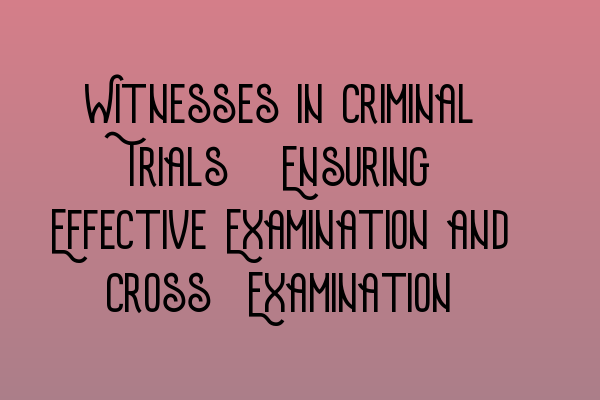Witnesses in Criminal Trials: Ensuring Effective Examination and Cross-Examination
Introduction
Welcome to SQE Criminal Law & Practice Law UK! In this article, we will discuss the importance of effective examination and cross-examination of witnesses in criminal trials. As solicitors, it is our duty to ensure a fair and just trial for our clients. By mastering the art of questioning witnesses, we can present a strong case and advocate for our clients’ rights.
The Role of Witnesses
Witnesses play a crucial role in criminal trials. They provide firsthand accounts of events and present evidence that can either support or undermine a case. It is essential to thoroughly examine witnesses to elicit accurate and reliable information. Effective examination helps establish the credibility of witnesses and strengthens the overall case.
The Importance of Cross-Examination
Cross-examination is a critical component of a criminal trial. It allows solicitors to challenge the testimony and credibility of witnesses presented by the opposing party. Through skillful questioning, solicitors can expose inconsistencies, biases, or ulterior motives that may affect the reliability of the witness’s statements. Cross-examination is an opportunity to present alternative theories and cast doubt on the prosecution’s case.
Techniques for Effective Examination
1. Preparation
Thorough preparation is key to effective examination. Familiarize yourself with the case, witness statements, and relevant legal precedents. Consider potential lines of questioning and anticipate the witness’s responses. By being well-prepared, you can strategically guide the examination process.
2. Open-Ended Questions
Use open-ended questions to allow witnesses to provide detailed accounts. This helps in extracting valuable information and provides an opportunity for the witness to reveal inconsistencies in their own statements. Open-ended questions also encourage witnesses to think critically and provide a more accurate recollection of events.
3. Active Listening
Active listening is crucial during examination. Pay attention to the witness’s responses, body language, and tone to identify potential areas for further exploration. It is essential to adapt your questioning based on the information provided by the witness during the examination.
4. Structured Approach
Adopt a structured approach during examination to maintain clarity and coherence. Organize your questions logically, ensuring a smooth flow and avoiding confusion. This helps in presenting a clear case to the judge and jury.
Cross-Examination Techniques
1. Leading Questions
Use leading questions during cross-examination to control the narrative and guide the witness’s testimony. Leading questions often elicit simple “yes” or “no” answers, preventing witnesses from elaborating further or changing their accounts. This can be effective in challenging the witness’s version of events.
2. Impeachment Evidence
Impeachment evidence refers to evidence that contradicts or undermines the witness’s credibility. Use prior inconsistent statements, past convictions, or other evidence to challenge the witness’s reliability. Impeachment evidence can significantly weaken the opposing party’s case and create doubt in the minds of the jury.
3. Controlling Emotional Testimony
During cross-examination, witnesses may become emotional or attempt to manipulate the courtroom with their testimony. Maintain control of the proceedings and prevent witnesses from derailing the questioning. By staying composed and focused, you can effectively challenge emotional testimony and redirect the focus back to the facts of the case.
Conclusion
Effective examination and cross-examination of witnesses are essential skills for solicitors practicing criminal law. By utilizing techniques such as thorough preparation, open-ended questioning, active listening, leading questions, impeachment evidence, and controlling emotional testimony, solicitors can present a strong and persuasive case for their clients.
For more resources on SQE preparation, check out our related articles:
